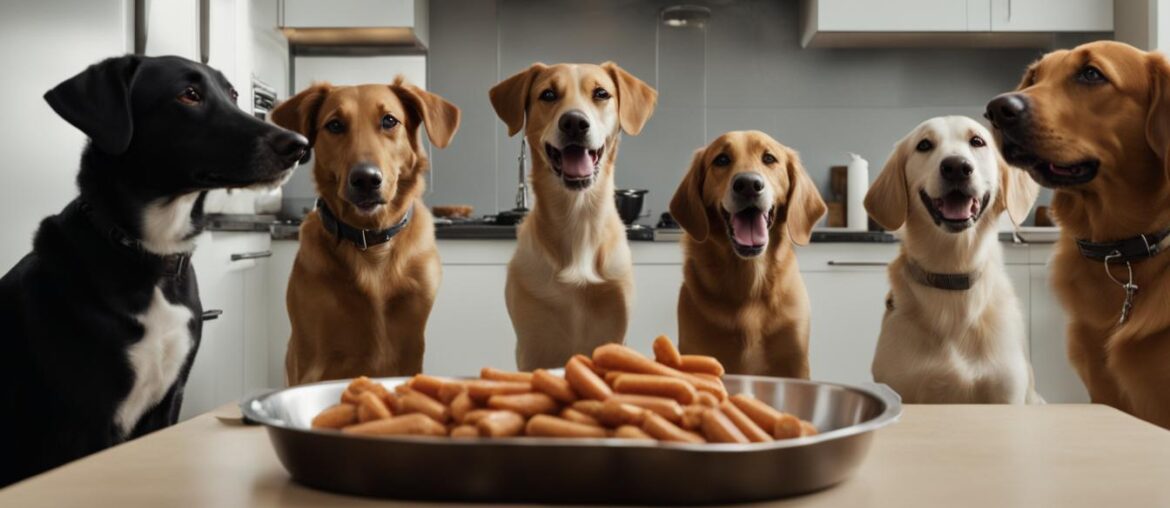Vienna sausages are a popular snack that many people enjoy. However, when it comes to feeding Vienna sausages to your furry friend, you might have some concerns. In this article, we will explore whether Vienna sausages are safe for dogs to eat and provide alternatives for treating your dog responsibly.
Key Takeaways:
- Vienna sausages are not safe for dogs due to toxic ingredients, high sodium content, preservatives, and excessive fat.
- Chicken, turkey, beef roast, and lean ground beef are healthier meat options for dogs.
- Homemade dog-friendly sausages can be a safe alternative to store-bought Vienna sausages.
- Feeding dogs a balanced and nutritious diet is crucial for their overall health and well-being.
- Consult with your veterinarian for personalized advice and guidance on your dog’s diet.
Understanding Vienna Sausages
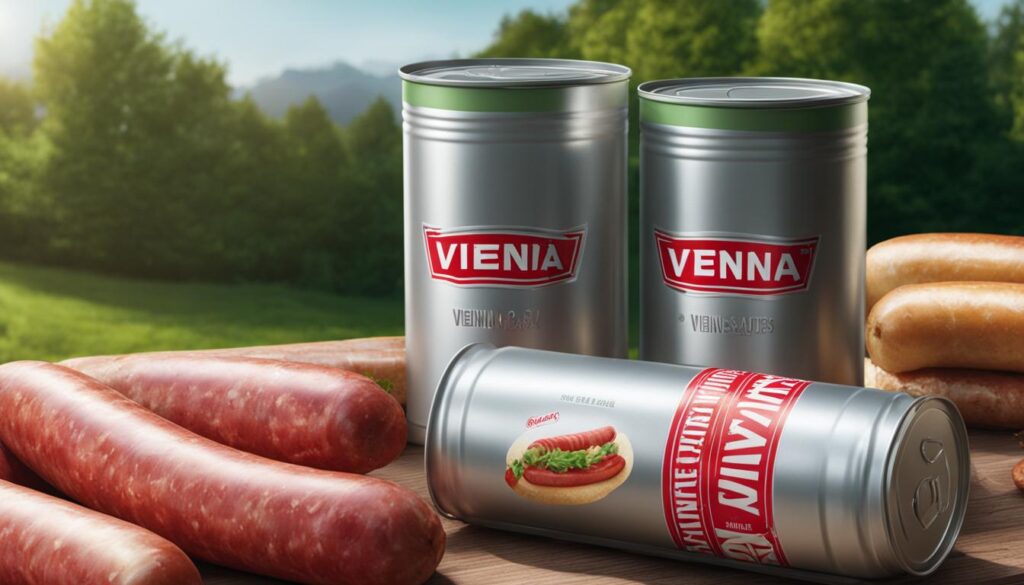
Vienna sausages are a type of smooth-textured sausage that originated in Vienna, Austria. They are typically made from beef or pork and can be found in both fresh and canned forms. In Austria, fresh Vienna sausages are common, while canned varieties are more prevalent in other countries.
These sausages are often compared to Frankfurters, which come from Frankfurt, Germany. Vienna sausages have a distinctive flavor and are known for their versatility in various dishes and snacks.
When it comes to the ingredients of Vienna sausages, the traditional recipe typically includes a combination of finely ground meat, fat, spices, and seasonings. The exact ingredients can vary depending on the manufacturer and the specific recipe being used. However, most Vienna sausages are made with high-quality meat and are formulated to provide a satisfying taste and texture.
Vienna sausages are a popular choice for picnics, lunchboxes, and quick meals due to their convenient size and preparation. They can be enjoyed on their own as a snack, added to sandwiches, or incorporated into various recipes.
Origin of Vienna Sausages
Vienna sausages have a rich history that dates back to the late 18th century. They were first introduced in Vienna, Austria, and quickly gained popularity throughout Europe. Vienna sausages were renowned for their flavor and became a staple in Austrian cuisine.
Over time, Vienna sausages gained international fame and spread to other parts of the world. Different countries adopted their own variations of Vienna sausages, with slight differences in ingredients and cooking methods. However, the core essence of Vienna sausages, with their smooth texture and satisfying taste, remains consistent.
Today, Vienna sausages are enjoyed by people around the globe and continue to be a beloved snack and ingredient in various culinary traditions. Their unique flavor and versatility make them a favorite choice for many.
The Dangers of Feeding Vienna Sausages to Dogs
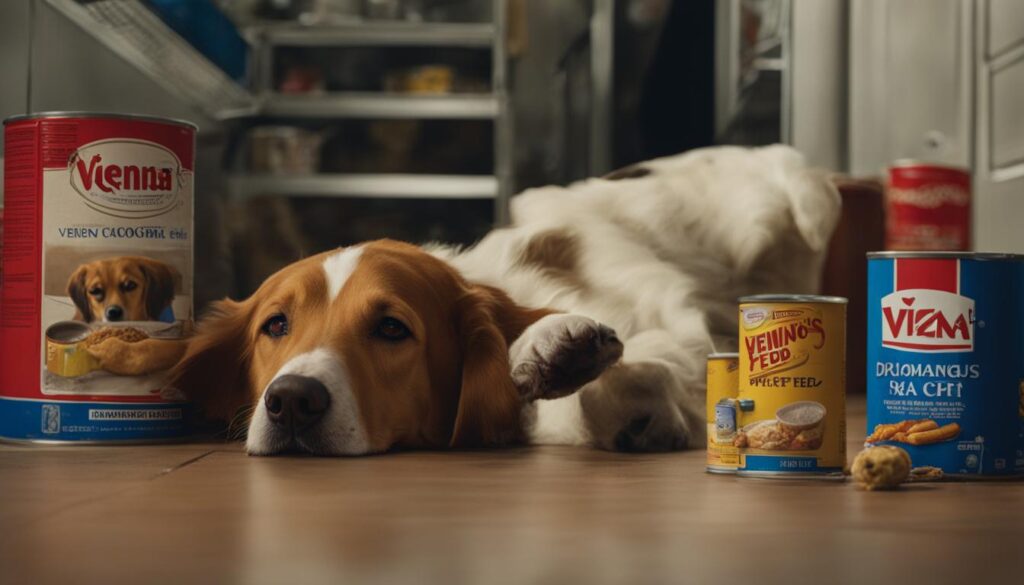
Despite their appeal to dogs, Vienna sausages should not be given to them. There are several reasons why these sausages are not safe for canine consumption.
Toxic Ingredients: Vienna sausages may contain ingredients that are toxic to dogs, such as garlic powder or onion powder.
High Sodium Content: Vienna sausages are high in sodium, which can lead to dehydration and other health issues in dogs.
Health Problems from Additives: The additives and preservatives in Vienna sausages can cause serious health problems in dogs, including heart disease.
Excessive Fat: Vienna sausages have a considerable amount of fat, which can contribute to weight gain and increase the risk of organ-related illnesses in dogs.
Better Meat Options for Dogs
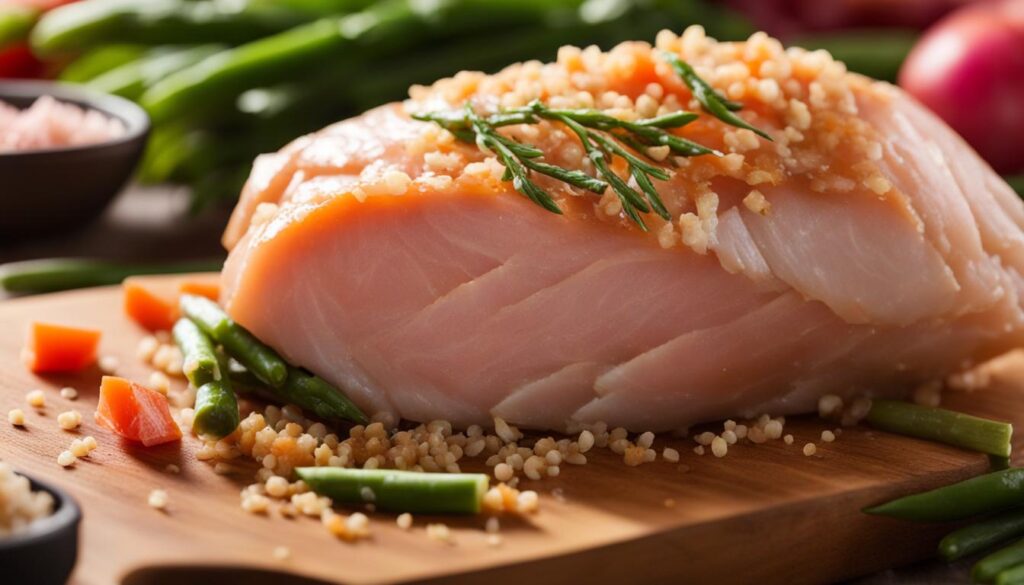
While Vienna sausages are not a suitable choice for dogs, there are other meats that can be a part of their healthy diet. Chicken, turkey, beef roast, and lean ground beef are all good protein sources for dogs. These meats can help with muscle growth, tissue repair, and overall health. It’s important to serve these meats plain, without any added spices or seasonings that may be harmful to dogs.
Protein Sources for Dogs
When it comes to providing a balanced diet for your furry friend, protein plays a crucial role. Dogs are carnivores by nature, and protein helps support their muscle development and repair. Chicken, turkey, beef, and lean ground beef are all excellent sources of protein for dogs.
Chicken: Chicken is a lean and readily available protein source for dogs. It provides essential amino acids and is low in fat. Whether you opt for boneless, skinless chicken breasts or thighs, make sure the chicken is cooked thoroughly to kill any harmful bacteria.
Turkey: Turkey can be a healthy addition to your dog’s diet, especially during special occasions like Thanksgiving. It offers lean protein, vitamins, and minerals. Ensure it is well-cooked, boneless, and free from any seasonings or additives that might be harmful to your dog.
Beef Roast: Beef roast is another protein-rich option for dogs. It contains essential nutrients like iron, zinc, and B vitamins. Choose lean cuts of beef roast and cook them without added fats or seasonings. Remember to remove any bones before serving.
Lean Ground Beef: Lean ground beef is an easily accessible and versatile protein source for dogs. It’s important to choose lean cuts with low-fat content to avoid unnecessary calories. Cook the ground beef thoroughly to eliminate any potential harmful bacteria.
Feeding your dog these healthy meat choices in moderation can help promote their overall well-being and provide essential nutrients for a healthy and balanced diet.
| Meat | Protein Content (per 100g) | Fat Content (per 100g) |
|---|---|---|
| Chicken | 25g | 1g |
| Turkey | 27g | 1g |
| Beef Roast | 26g | 4g |
| Lean Ground Beef | 26g | 10g |
These protein sources offer the necessary nutrients without the harmful additives and excessive sodium found in Vienna sausages. Remember to always consult with your veterinarian before making any significant changes to your dog’s diet.
Moderation and Caution with Vienna Sausages
While Vienna sausages should generally be avoided, there are potential benefits to feeding them to dogs in moderation. Vienna sausages can serve as a protein source for dogs and their high palatability can make them appealing as a treat or during training sessions. Feeding Vienna sausages in moderation allows for variety in a dog’s diet and can be particularly useful in enticing dogs with a diminished appetite.
However, it’s crucial to exercise caution when incorporating Vienna sausages into your dog’s diet. The focus should always be on a well-balanced and healthy overall diet for your furry friend. This means prioritizing high-quality dog food and treats that are specifically designed to meet their nutritional needs.
Feeding Vienna sausages to dogs should be done sparingly and with careful consideration. It’s essential to monitor the quantities given to avoid excessive consumption and potential health issues associated with the ingredients and additives commonly found in Vienna sausages.
While Vienna sausages can offer a temporary change in taste and texture for dogs, they should not become a staple in their diet. A diverse range of healthy and dog-friendly protein sources should be the foundation of your dog’s meals. This ensures that they receive all the necessary nutrients for optimal health and wellbeing.
To provide your dog with a well-rounded diet, consult with your veterinarian. They can provide personalized guidance on the appropriate types and amounts of food for your specific dog, including whether Vienna sausages can be safely incorporated in moderation.
Remember, the key is to prioritize your dog’s health and ensure that their diet meets their nutritional requirements. Feeding Vienna sausages to dogs should only be done under the guidance of a veterinary professional, carefully considering the potential benefits and risks associated with these sausages.
Guidelines for Feeding Vienna Sausages to Dogs
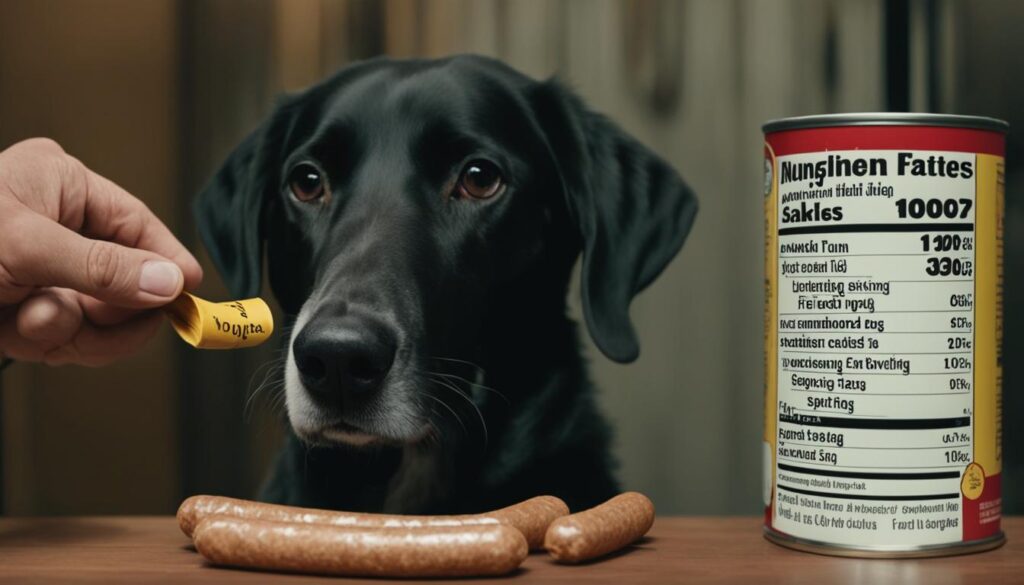
If you choose to feed Vienna sausages to your dog, it’s important to follow some guidelines to ensure their safety.
- Read ingredient labels: Carefully examine the ingredients list on the packaging of Vienna sausages. Avoid sausages that contain toxic additives or preservatives that can harm your dog’s health.
- Consult a veterinarian: Before introducing new foods into your dog’s diet, it is essential to consult with a veterinarian. They can provide personalized guidance and advise you on whether Vienna sausages are appropriate for your dog.
- Determine appropriate portions: Based on your dog’s size, determine the appropriate portion size of Vienna sausages. Dogs have different dietary needs, so it’s crucial to feed them the right amount to avoid digestive issues or weight problems.
- Cook Vienna sausages thoroughly: If you decide to cook Vienna sausages for your dog, ensure they are fully heated to kill any harmful bacteria or parasites. Cooking them will help minimize the risk of foodborne illnesses.
- Start with small amounts: When introducing Vienna sausages to your dog’s diet, start with small amounts. Monitor how your dog reacts to the sausages and watch for any negative reactions or digestive problems.
| Guidelines for Feeding Vienna Sausages to Dogs: | |
|---|---|
| 1. Read ingredient labels | Carefully examine the ingredients list on the packaging to avoid sausages with toxic additives or preservatives. |
| 2. Consult a veterinarian | Seek professional advice from a veterinarian to ensure Vienna sausages are safe for your dog’s specific dietary needs. |
| 3. Determine appropriate portions | Finding the right portion size based on your dog’s size is crucial to maintain a balanced diet and prevent digestive issues. |
| 4. Cook Vienna sausages thoroughly | When cooking Vienna sausages for your dog, ensure they are fully heated to eliminate any potential bacteria or parasites. |
| 5. Start with small amounts | Introduce Vienna sausages gradually and monitor your dog for any negative reactions or digestive problems. |
Homemade Dog-Friendly Sausage Recipes
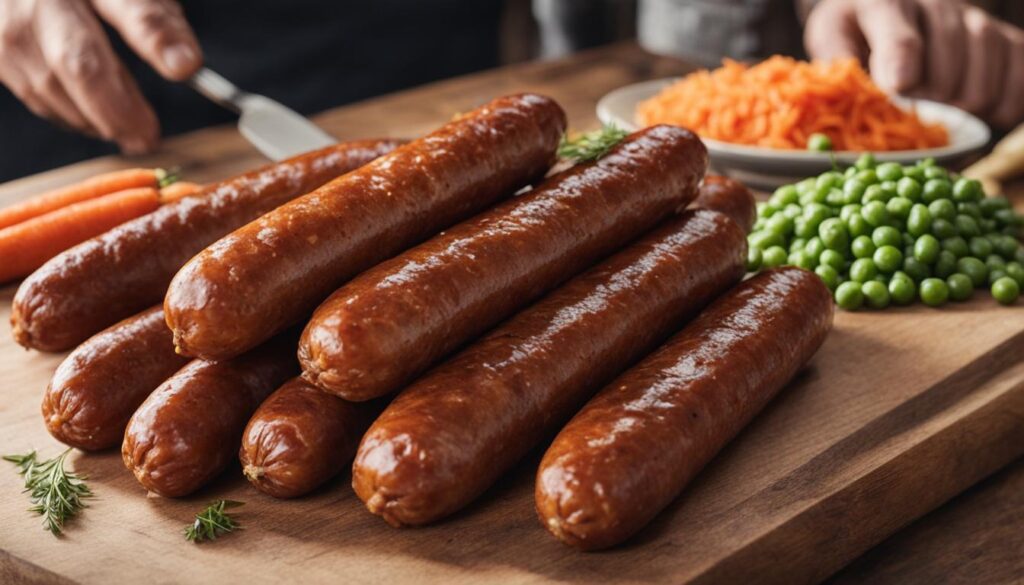
To ensure the safety and quality of the sausages you feed your dog, you can consider making homemade dog-friendly sausages. Homemade sausages are a healthier and safer alternative to store-bought Vienna sausages. By using dog-friendly ingredients and simple cooking methods, you can provide your dog with a nutritious and tasty treat.
When making homemade dog sausages, it’s important to use lean meats such as ground beef or a lean meat mixture. These meats are rich in protein and offer essential nutrients for your dog’s overall health. Additionally, you can add low-sodium broth or water to keep the sausages moist.
To enhance the flavor of the sausages, you can include optional dog-safe herbs or spices. Avoid using ingredients like garlic or onion, as they can be harmful to dogs. Instead, opt for herbs like parsley or basil, which are safe and add a burst of freshness to the sausages.
Adding vegetables to the sausages can provide additional nutrients and fiber. For example, you can finely chop carrots or zucchini and incorporate them into the sausage mixture. This will not only add nutritional value but also contribute to the texture and taste of the sausages.
When it comes to cooking the sausages, there are several methods you can choose from. Steaming the sausages will help retain moisture and preserve the nutrients. Baking them in the oven is another option, providing a slightly crisp exterior and a moist interior. Pan-frying the sausages can create a tasty crust, but make sure to use minimal oil or a non-stick pan to avoid excessive fat.
Here is a simple recipe for homemade dog-friendly sausages:
Ingredients:
- 1 pound lean ground beef
- 1/2 cup low-sodium broth or water
- Optional: dog-safe herbs or spices
- Optional: finely chopped vegetables
Instructions:
- Mix the ground beef, broth or water, and optional herbs or spices in a bowl.
- If using vegetables, finely chop them and add them to the mixture.
- Shape the mixture into sausage-like patties or roll them into cylindrical shapes.
- Choose your preferred cooking method – steam, bake, or pan-fry – and cook the sausages until fully cooked and no longer pink in the center.
- Allow the sausages to cool before serving them to your dog.
Remember to always consult with your veterinarian before introducing new foods into your dog’s diet. Homemade dog sausages can be a nutritious and safe treat when made with the right ingredients and prepared using appropriate cooking methods.
| Sausage Type | Ingredients | Cooking Method |
|---|---|---|
| Beef Sausage | Lean ground beef, low-sodium broth or water, optional herbs or spices, optional finely chopped vegetables | Steaming, baking, or pan-frying |
| Chicken Sausage | Lean ground chicken, low-sodium broth or water, optional herbs or spices, optional finely chopped vegetables | Steaming, baking, or pan-frying |
| Turkey Sausage | Lean ground turkey, low-sodium broth or water, optional herbs or spices, optional finely chopped vegetables | Steaming, baking, or pan-frying |
Understanding a Balanced Dog Diet
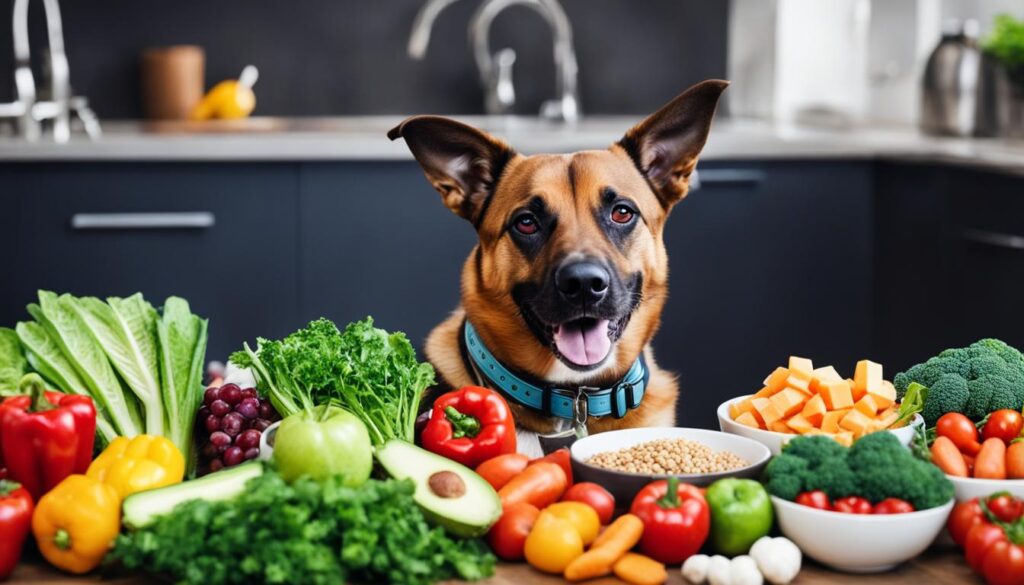
Feeding your dog a balanced diet is crucial for their overall health and well-being. As responsible pet owners, it’s our responsibility to ensure that we meet the nutritional needs of our furry friends. While it might be tempting to share our meals with them, it’s important to understand that dogs have specific dietary requirements that differ from ours.
One of the key components of a balanced diet for dogs is high-quality dog food. These foods are specifically formulated to provide the necessary nutrients dogs need to thrive. They contain the right balance of proteins, carbohydrates, fats, vitamins, and minerals that dogs require for optimum health.
When choosing dog food, look for reputable brands that prioritize quality ingredients and meet industry standards for nutritional completeness. Reading the product labels can give you a better understanding of what you’re feeding your dog and help you make informed decisions. Consulting with your veterinarian can also provide valuable guidance in selecting the right dog food for your pet.
Treats should also be considered an integral part of your dog’s diet. While they can be a great way to reward good behavior or provide enrichment, it’s crucial to choose treats that are safe and beneficial for dogs. Look for treats that are specifically made for dogs and are low in additives, preservatives, and unnecessary fillers.
Avoid feeding your dog table scraps or foods that are high in sugar, salt, or unhealthy fats. These can lead to weight gain, digestive issues, and other health problems. It’s also important to avoid feeding your dog foods that are toxic to them, such as chocolate, onions, garlic, and grapes.
Investing in your dog’s diet is an investment in their long-term health and happiness. By providing them with a balanced diet that consists of high-quality dog food and appropriate treats, you’re ensuring that they receive the nutrients they need to thrive and live a fulfilling life.
Nutritional Needs of Dogs
| Nutrient | Recommended Daily Amount |
|---|---|
| Protein | Varies depending on age, size, and activity level |
| Fat | Varies depending on age, size, and activity level |
| Carbohydrates | Varies depending on age, size, and activity level |
| Vitamins | Varies depending on age, size, and activity level |
| Minerals | Varies depending on age, size, and activity level |
| Water | Varies depending on age, size, and activity level |
Wrapping Up
In conclusion, it is not safe for dogs to eat Vienna sausages. These sausages can be harmful to dogs due to the toxic ingredients, high sodium content, preservatives, and excessive fat they contain. Feeding Vienna sausages to dogs can lead to dehydration, health problems, and weight gain.
However, there are healthier meat options that can be included in a dog’s diet. Chicken, turkey, beef roast, and lean ground beef are all good choices as they provide essential proteins for muscle growth and tissue repair. It’s important to serve these meats plain, without any added spices or seasonings that could be harmful to dogs.
If you still want to offer your dog sausage-like treats, homemade dog-friendly sausage recipes can be a safe alternative. By using lean meats, low-sodium broth or water, and dog-safe herbs or spices, you can provide a nutritious and safe option for your furry friend.
Remember, maintaining a balanced and nutritious diet is vital for your dog’s overall health and well-being. Consult with your veterinarian for personalized advice and guidance on the best diet for your dog to ensure they receive the necessary nutrients and avoid potential health risks.
FAQ
Are Vienna Sausages safe for dogs to eat?
No, Vienna sausages are not safe for dogs to eat. They may contain toxic ingredients, high sodium content, additives, and excessive fat, which can all pose health risks to dogs.
What are Vienna sausages?
Vienna sausages are a smooth-textured sausage that originated in Vienna, Austria. They are typically made from beef or pork and can be found in fresh or canned forms.
What are the dangers of feeding Vienna sausages to dogs?
Vienna sausages can contain toxic ingredients like garlic powder or onion powder, high levels of sodium, additives, and preservatives, and excessive fat, all of which can lead to various health issues in dogs.
What are some better meat options for dogs?
Some healthy meat choices for dogs include chicken, turkey, beef roast, and lean ground beef. These meats provide essential protein for muscle growth and overall health when served plain without added spices or seasonings.
Can Vienna sausages be given to dogs in moderation?
While Vienna sausages should generally be avoided, they can potentially be given to dogs in moderation as a protein source or during training sessions. However, it’s essential to prioritize a well-balanced and healthy diet for your dog.
What are the guidelines for feeding Vienna sausages to dogs?
To feed Vienna sausages to dogs, carefully read the ingredients list, avoid sausages with toxic additives or preservatives, consult with your veterinarian, determine appropriate portions based on your dog’s size, and ensure the sausages are fully cooked to eliminate harmful bacteria or parasites.
Can I make homemade dog-friendly sausages?
Yes, you can make homemade dog-friendly sausages using lean meats like ground beef or a lean meat mixture, low-sodium broth or water, and optional dog-safe herbs or spices. Simple cooking methods such as steaming, baking, or pan-frying can be used to prepare the sausages.
How important is a balanced diet for dogs?
A balanced diet is crucial for a dog’s overall health and well-being. It is recommended to prioritize high-quality dog food specifically formulated to meet their nutritional needs. Treats should also be chosen wisely, focusing on those that are safe and beneficial for dogs.
What is the conclusion of this article?
In conclusion, Vienna sausages are not safe for dogs to eat due to the potential hazards they pose. It is essential to prioritize a balanced and nutritious diet for your dog, consulting with your veterinarian for personalized advice and guidance.


